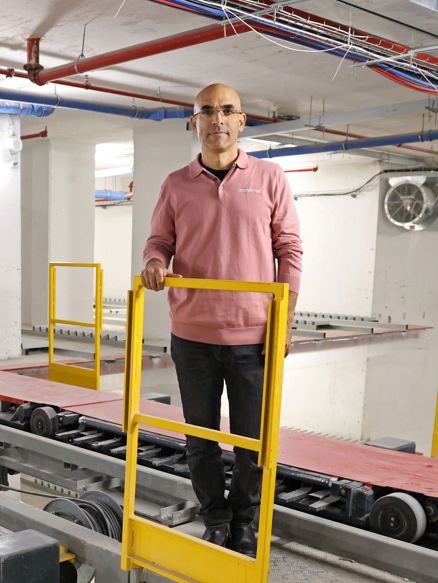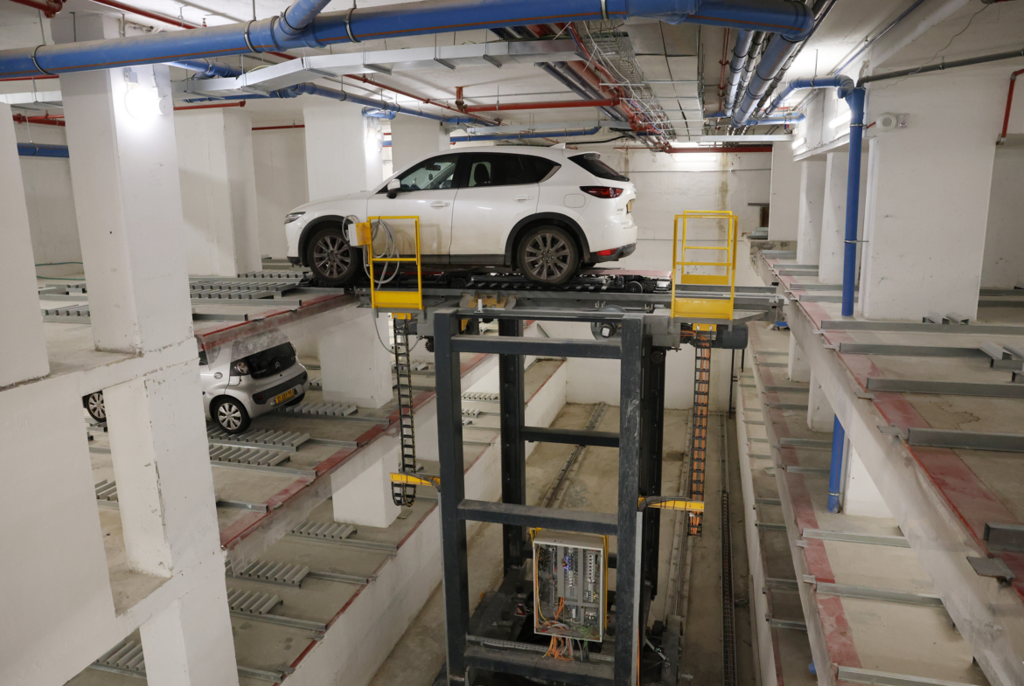Parkomat, a company specializing in the development, construction, and operation of automated parking systems will provide Tel Aviv with the first fully automated parking. Founded by Gior Naveh, the company specializes in the development, construction, and operation of automated parking systems,
Read more:
"16 years ago, I gathered friends who were with me in the air force - three of them are my partners today - and we met Yitzhak Givati, who had a successful crane company called Parkomat, Naveh says. "His representative asked us to promote a robotic parking garage he had developed. Naively, we thought the product had great potential and agreed. He asked us to be his franchisees."
Educating the clientele
Parkomat has established itself in the market by selling hundreds of automated parking systems for various projects, including residential, office, and hotel developments. The company went public on the Tel Aviv Stock Exchange about a year and a half ago, with a market valuation of approximately $22.2 million. With annual revenues reaching tens of millions of shekels, Parkomat is on a fast growth trajectory, boasting an order backlog of around $57 million as of the end of August.
The company is now poised to introduce a groundbreaking project: Tel Aviv's first public urban robotic parking lot, set to operate with Parkomat's technology, is scheduled to open in the near future. This municipal facility will offer 224 parking spaces, though the pricing structure is yet to be determined.
Naveh, age 54, welcomes us at the entrance to the parking lot. As the lot is not yet operational for public use, he guides us to a private residential building in the southern part of the city to demonstrate a similar system in action. The process is straightforward and impressive: drivers arrive at a silver gate, where they summon an elevator with the press of a button. Once the traffic light turns green, they drive into the elevator, exit and lock their vehicle, take the keys, and leave the elevator, which then transports the car to a designated spot in the multi-level underground parking lot.
When drivers return, they simply reverse the process. The elevator retrieves the vehicle and delivers it back to the gate. In the public lot, payment for parking will be made upon exiting. This efficient system not only saves time by eliminating the search for a parking spot but also maximizes space utilization due to its subterranean, multi-story design.
"This is the most significant financial project we've undertaken," Naveh proudly shares. "Last year, the company managed projects worth $16.6 million, but the Bograshov project alone amounted to $7.5 million. We secured this project through the municipality's tender. Six years ago, when a similar tender was issued, we didn't participate as we felt we weren't ready.
"A smaller supplier who quoted a relatively low price won that tender, but unfortunately, they went bankrupt two years ago. The Beach Authority had already built a basement according to the previous supplier's specifications and found themselves in a predicament, leading to the issuance of a new tender. They sought proposals for this pre-existing basement structure. Among the two companies that responded, we were one, and despite our higher quote, the Beach Authority chose us."
What is the parking structure going to look like?
"It will have four entrances and exits, and seven elevators working in parallel. In such a parking lot, there are several backup systems, and the probability of a halt in operation is almost nil. If one parking spot fails, other vehicles will still be able to leave.
"Someone will be on call 24/7 to provide technical assistance wherever possible, and there is a Beach Authority center that can be reached at the press of an intercom button. They can handle some of the issues - for instance, if the barrier gets stuck. If the machine breaks down, it's not certain they can help, and then our maintenance people are called.
"It's a new thing that requires educating customers and that's a challenge, there's no question, but it's also fascinating. I invest a lot of hours in this project, and I'm confident that we will succeed in it."
A rocky start
The initial phase was fraught with uncertainty. In the three years following the company's establishment, they navigated through uncharted territory, driven by determination and tenacity. "We are technologically oriented people, with qualifications in engineering and technology, but we struggled to discern the path forward. We attempted to engage entities like Israel Railways in an effort to immediately secure substantial projects using technologies we had imported, but those endeavors proved too ambitious for us."
Did you have competitors early on?
"When we entered the market, there were two companies that brought parking systems for residential buildings from Germany, kind of a simple elevator. We wanted to venture into the world of robotic parking. At first, it seemed simple - a world that has existed for years around the globe. We thought we would take products from Korea, China, Germany, bring them here, and assemble them.
"But it wasn't simple, because the market in Israel is not like the market in Europe, where there are parking systems with 300-400 spots in one building, systems that have been operational for 50 years. There's a facility in Milan that has been in operation since 1967, with 600 parking spots, owned by Sotefin company from Switzerland. Since then, they have built hundreds of parking lots. Today, we work with them in the country."
The urban renewal trend gave them a serious boost. "The initiators of these projects need a parking solution. Initially, we did one or two projects a year. This helped because the processes are very complex and require careful coordination between many entities - municipality, fire extinguishing, electricity, installation, architecture, and conservation, each pulling in its own direction and optimizing."
How many projects are currently in the works?
"We are currently managing 40-50 simultaneous projects spread across the Greater Tel Aviv area, stretching from Kfar Saba to Rehovot, Ness Ziona, and Jerusalem. The Greater Tel Aviv region is the most active. I might be among the highest-priced in the market today, but this cost is a reflection of the extensive business infrastructure we have in place.
"We have nearly 70 employees in our Ness Ziona-based company, with around 20 individuals specifically tasked with maintaining a dedicated malfunction response system. Our team is required to address issues in real time. Can you imagine a scenario where a facility halts in the morning and fails to retrieve a car from the parking lot, and we don't respond within minutes? We go to the extent of covering taxi fares for people whose cars are stuck in the parking lot."
 Giora NavehPhoto: Dana Koppel
Giora NavehPhoto: Dana KoppelYou went public 18 months ago.
"From a financial standpoint, we didn't require any extra capital as our company had no outstanding loans. We had gradually built ourselves up, keeping a conservative approach. However, we recognized the necessity of going public. We foresaw that the industry would become highly sophisticated in four years, and only major firms would be able to meet the demands."
Who are your investors?
"In terms of the stock market, institutional entities such as Israel Canada, Aura Investments, and others view us as a relatively small company. However, they recognize our significant growth potential in the future. As a result, they have placed their trust in us. Currently, the company is entering a new phase. A couple of years ago, our focus was on gaining a foothold in the market. Now, our emphasis is on expansion. The Tel Aviv project serves as the prime example of this growth."
First published: 22:54, 02.28.24


